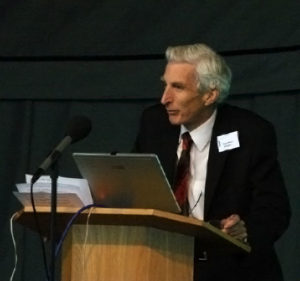We know the universe had an origin or a beginning. Science calls this singularity the "Big Bang" theory, a term originally coined by a very famous scientist (and atheist) named Fred Hoyle. Sir Fred Hoyle Hoyle was mocking the idea that our universe could have had an origin because at that time it was believed our universe was too complex to have had a beginning. The eternal or "steady state" universe was preferred by scientists and intellectuals because the universe with an origin required too much to explain. Hoyle had lots of company with him in agreement in their belief that the universe was eternal, including the atheist philosopher Bertrand Russell. Even very smart people are humans, and all humans make mistakes, both honestly and dishonestly. However, after seeing the evidence for the Big Bang, Hoyle drastically changed his tune and said this: "Some super-calculating intellect must have designed the properties of the carbon atom. Otherwise, the chance of my finding such an atom through the blind forces of nature would be utterly miniscule. A commonsense interpretation of the facts suggests that a super-intellect has monkeyed with physics, as well as chemistry and biology and that there are no blind forces worth speaking about in nature. The numbers one calculates from the facts seem to me so overwhelming as to put this conclusion almost beyond question." Hoyle, Fred, "The Universe: Past and Present Reflections. "Engineering and Science", November 1981. pgs. 8–12. I felt this quote by Dr. Hoyle was so important that I included it in my book The God … [Read more...]
Compounded improbabilities
[AUTHOR'S NOTE: This is the final article originally published at Examiner.com in the series on the theory of evolution, on a favorite topic of mine: is it possible to quantify the luck that would be necessary to explain our existence, without invoking a supernatural Creator of all things? The secular approach to eliminating God from creation can take at least two different, diametrically opposed forms. The goal of both is to eliminate a problem called fine-tuning of this universe, described in this article. First, there is the multiverse hypothesis, which improves the probability of "this" (successful) universe by speculating an unknown number of unsuccessful universes were also created at the Big Bang anomaly. The other option is that it may be argued that the creation of the universe was actually deterministic (Grand Unified Theory, or GUT) assuming that this universe had no choice except to exist, and to enable complex life to exist.] Compounded improbabilities Cosmologist Sir Martin Rees has declared that “just six numbers” dictate the nature of our universe. For clarity and ease of discussion, these six values shall be referred to as “cosmic factors” for the remainder of this article. Apparently to avoid giving a divine Creator any credit, Rees said, These six numbers constitute a 'recipe' for a universe. Moreover, the outcome is sensitive to their values: if any one of them were to be 'untuned', there would be no stars and no life. Is this tuning just a brute fact, a coincidence? Or is it the providence of a benign Creator? I take the view that it is … [Read more...]
The odds against atheism
Imagine that you're playing a game of poker, five card draw. The dealer issues each player five cards, one at a time. He deals fairly, taking the top card from the shuffled deck and tossing them face down to each player in a counter-clockwise rotation as he goes around the table in order. You look at your cards and discover that you've been dealt a royal straight flush: the ace, king, queen, jack, and ten of hearts. You don't even need to discard and draw another card. You struggle to hide your excitement, knowing that the odds of drawing such a lucky hand are roughly 649, 740 to 1. This translates to a probability of success of 0.00000154, a mere fraction of one percent. Naturally, you should expect to win this hand. Even a royal straight won't be good enough to beat you. It doesn't beat the royal straight flush. Nothing does. The best another player could have done would be to draw a second royal straight flush in either diamonds, clubs or spades, splitting the jackpot with you. But the odds of two events with a probability of 0.00000154 percent occurring in the same hand of cards is considerably worse than the single rare occurrence, because the number of cards and possible winning combinations have been reduced. Furthermore, if two players in the same game drew a royal straight flush from the same deck of cards in the same hand, somebody somewhere would naturally certainly be accused of cheating. One royal flush is highly improbable; twice in the same hand absurdly so. The cards would be checked for signs of marking or tampering, and the dealer … [Read more...]


